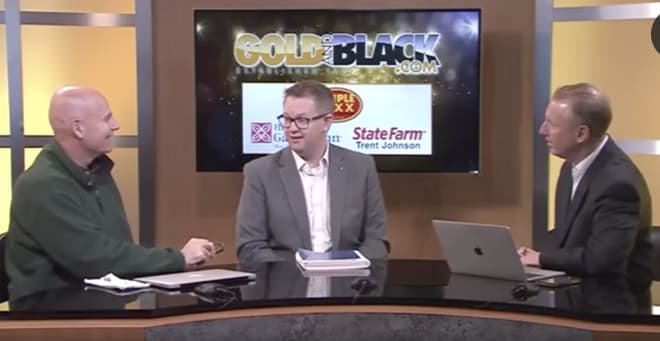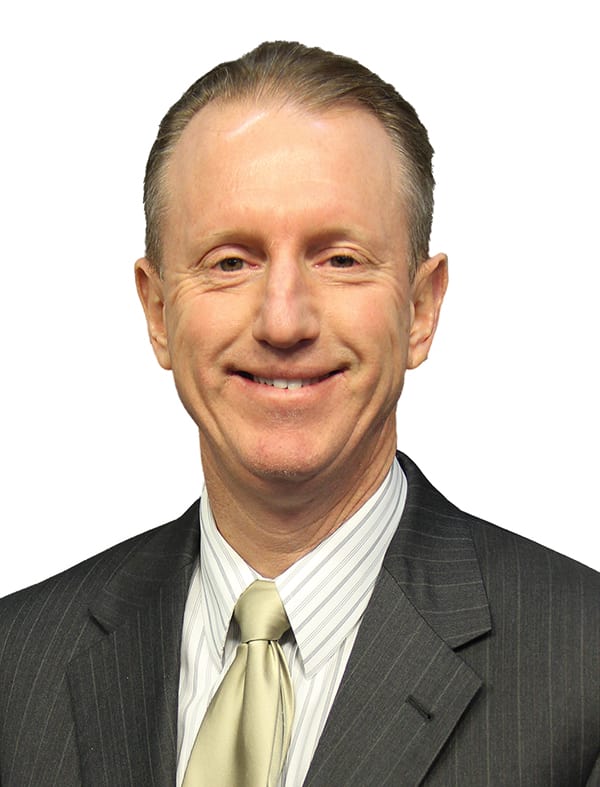
Tom Mitchell, in his ninth year at Purdue as head of compliance for Purdue Athletics sat down with Tom Dienhart and Alan Karpick for a recent edition of “Gold and Black LIVE.” Here is that he had to say about his jobs and some of the challenges topics of NCAA gambling and name, image and likeness legislation.
GoldandBlack.com: Give us a quick rundown of what your job is.
Mitchell: The way I like to explain it is if you think of it in terms of a pyramid, having four major levels to it, the bottom base level is going to be education. The primary thing we do is answer questions, put together presentations, and try to educate whether through emails or in person with our coaches, with our student athletes, with our staff, and with our donors.
The next layer would be monitoring. That would be us checking on comp ticket lists, checking on contacts, the off campus recruiting that our coaches do, practice hour limits, those kinds of things.
The next to the top layer, which again would be smaller, would be policies and procedures. We are right at policies and procedures based upon the rules that we are educating on, and we have systems in place to monitor those and make sure the systems are working, that they are educating, that they are self-reporting.
The last piece would be enforcement. That will be some of the smaller-type violations. That’s to show that you get educated, and you have systems in place. People are going to make mistakes, honest mistakes. That’s good, because then, if they are self-reporting, it means your systems work. It means you have institutional control.
GoldandBlack.com: So they know what their mistakes are?
Mitchell: Exactly. I think when you look at schools that don’t have any violations in a year, it makes you scratch your head. We have anywhere between 12-17 per year in the nine years I’ve been here.
It is a good sign that our coaches and staff are aware of the rules. So they are coming to us ahead of time saying “We want to do this, but we know we can’t.” So we’re able to try to find a way to do it permissively and file a waiver (with the NCAA).
GoldandBlack.com: What’s the biggest challenge for you and how have you seen compliance change during your tenure?
Mitchell: I think my biggest challenge is that the rules are constantly changing. Every year, there’s a whole other cycle of legislative changes, and the interpretations can change at any given time. It is the way you have to apply and interpret those changes. That’s by far the biggest challenge for every single compliance person across the country.
GoldandBlack.com: What is unique about working in compliance at Purdue?
MitchelI: It is knowing that not all of the people that work in the athletic department are Purdue grads, but there is a fair amount. I find the non-Purdue love the place as much as the love the people that went here. Both groups don’t’ want to do anything to hurt it (Purdue’s reputation). And that’s unique.
Our student athlete, that profile, is also very unique. I think I’m smart, and I have athletes that have told me about their major and what they’re doing and I don’t get what they’re saying. I’m intently listening (trying to allow them to teach me).
My friends in the business at other schools tell me some of the big power coaches are difficult. I’ve got friends that they can’t even talk to those folks. They have to go through two or three different people. But there, Coaches Brohm, Shondell and Painter (to name a few) are great. If I need to call them or if my staff needs to call them, we have an open dialogue. That’s really one of the key things. We don’t have those barriers and layers.
We have fantastic support from the top. Our board is committed to doing things the right way, they are committed to backing what our mission is because we are committed to students first and athletes. President Daniels has been phenomenal. Just from a leadership standpoint, but also from a compliance standpoint. (Former athletics director) Morgan (Burke) was one of the best, he was a legend. So I obviously was a little nervous when he was going to retire but I couldn’t say enough nice things about Mike (Bobinski). He’s been fantastic. That’s not just because he gave me more staff. When you have great leadership, it really makes it easy to do what you need to do to get things done.
GoldandBlack.com: Did it surprise you that Indiana adopted the gambling legislation quickly?
Mitchell: I think nationally, when the Supreme Court made the decision in 2018, everyone was paying attention. Which states are going to go first? Growing up in Indiana, I’m not going to lie, I was a little surprised that you couldn’t buy alcohol on Sundays for I don’t know how long. We didn’t have daylight savings time, and yet we were really early adopters. That was a little surprising.
continue reading after the image below
GoldandBlack.com: How big of a change has it been educating your colleagues about the recent gambling legislation that made sports betting legal in Indiana?
Mitchell: For us, we have been educating about NCAA restrictions related to this topic for decades. For us, it’s not that big of a change. What changed was how our world around our athletes, our coaches, our staff, changed.
Now there are more opportunities, there’s more people that could be betting on it right here in the state. The biggest message we had to convey was you have to be a little bit tighter with the circle. You have to be a little bit more careful about who you bring in the circle. You can’t really be talking about how a teammate broke up with his significant other, if you’re struggling with an injury that no one knows about. Those kind of playing time and injury-related things, there’s some HIPAA concerns for sure, but even if it’s about yourself, and you’re able to disclose that, you just don’t know it.
As we started talking about that, we talked about it in our Athletic Affairs Committee meeting in August.
I found immediately that our faculty in the room engaged right away and said, ‘We want to be part of the safe space that we already are with our student athletes because they are students. If they are struggling, we want to be able to have them come in and say “Hey, I could use some office hours, not a review session. I need one-on-one time.”’ Because, and fill in the blank with what they’re struggling with.
I think a lot of people nationally, friends, and colleagues and some media, wondered how are you going to enforce this? Well, enforcing is not the first thing. A lot of rules and laws you don’t always have a clean and easy way to enforce it. First and foremost, it’s a policy and it’s a culture statement. It’s a statement about having that safe space for the student athlete so they can be a student.
GoldandBlack.com: It seems like it would make a lot of people’s lives a lot simpler if the coaches issues an injury report each week give the definitions of those categories, and the cut and dry, no questions.
Mitchell: It would be great, but, you’ve got teams trying to figure out if someone is defining it all the same way. I’m in the interpretation business. It sounds easy, but how do you define what is lower leg (for example)? Does that mean knee, does that mean ankle? If we could get on the same page I’m in favor of an injury report because I think it does level the playing field and reduces the risk of information being leaked.
GoldandBlack.com: What about prop bets (bet on situations and not just games)?
Mitchell: They’re here. We’re still trying to sort that out but right now, this information very new. There is no individual ones allowed for student athletes at Indiana schools, but there are some for non-Indiana student athletes in the casinos in the state.
I think the initial thought was we’ll worry about that when we have to worry about that, which will probably be three or four years down the road because it is a little more sophisticated of a type of bet, what you see in Europe. I think we’re going to see it sooner because it all is driven on what the casino and the betters want.
GoldandBlack.com: How often do you talk with the NCAA about rules?
Mitchell: Not as much with the NCAA. The first thing to remember is all rules are all made by the schools. We make the rules. The NCAA doesn’t make the rules. The NCAA helps apply the rules, it interprets them.
How often do we talk to academic and membership affairs – they do interpretations of waivers? It’s pretty frequent. We also communicate with the eligibility center frequently.
GoldandBlack.com: What’s next for the name, image, and likeness as far as what viewers and listeners should be looking for?
Mitchell: I think we’re going to see more conversations. What’s it going to look like, what can it look like, we are trying to get some consensus naturally. I think historically there is a difference between the Power 5 and Group of 5, and then also the rest of Division I who don’t sponsor football. It’s not bad and it’s not good, it’s just different. How are those interests alike (is still to be figured out)?
GoldandBlack.com: I think an athlete can get more compensation for their name, image, and likeness if you played football at Nebraska, Ohio State, Michigan, or Penn State. Would you agree?
Mitchell: Not necessarily. If it’s really opened all the way up, we have a lot of alumni all over the country and all over the world.
GoldandBlack.com: There’s a lot of stress on kids. In Division I athletics, it’s a challenging time in a lot of ways. How do you stay optimistic?
Mitchell: I’ve always approached this job and I ask the same for my staff, which is we’re not out to get anybody. We’re out to help everybody. If we’re doing our job the right way, we’re a resource for our coaches and our student-athletes. We’re trying to find solutions. In effect, there are no problems. There’s just opportunities to succeed.
We want to know what their goals are (for any situation). Figuring out the rules, this is our job. So if you (an athlete, coach or administrator) tell us your goal, we can try to get you there. To me, doing this, helping and being a part of helping student athletes be better people as citizens, academically, and on the field and court is why I love this job. To me, that is just so important.
What’s so important is having this enterprise, this opportunity that we can give to these kids to help them, to get them ready for life. We’re building future leaders. There is nothing more important.
Membership Info: Sign up for GoldandBlack.com now | Why join? | Questions?
Follow GoldandBlack.com: Twitter | Facebook | YouTube
More: Gold and Black Illustrated/Gold and Black Express | Subscribe to our podcast
Copyright, Boilers, Inc. 2019. All Rights Reserved. Reproducing or using editorial or graphical content, in whole or in part, without permission, is strictly prohibited.
